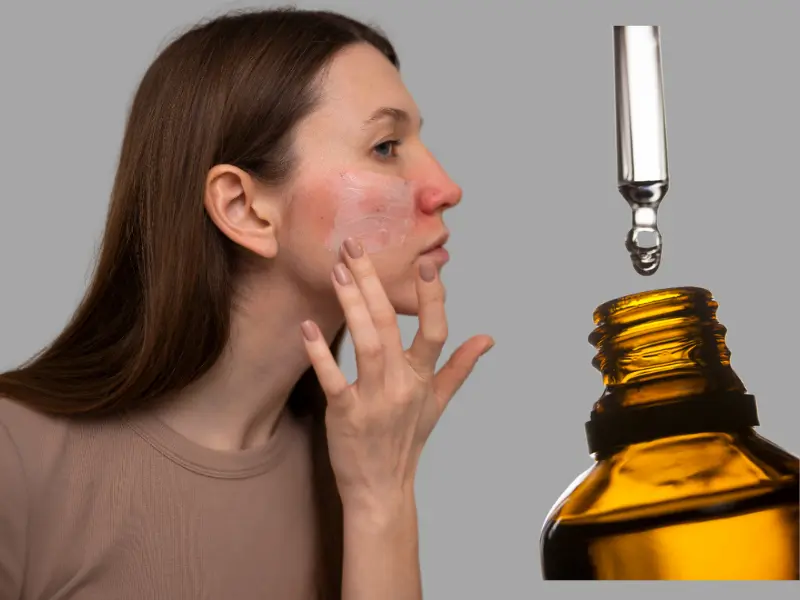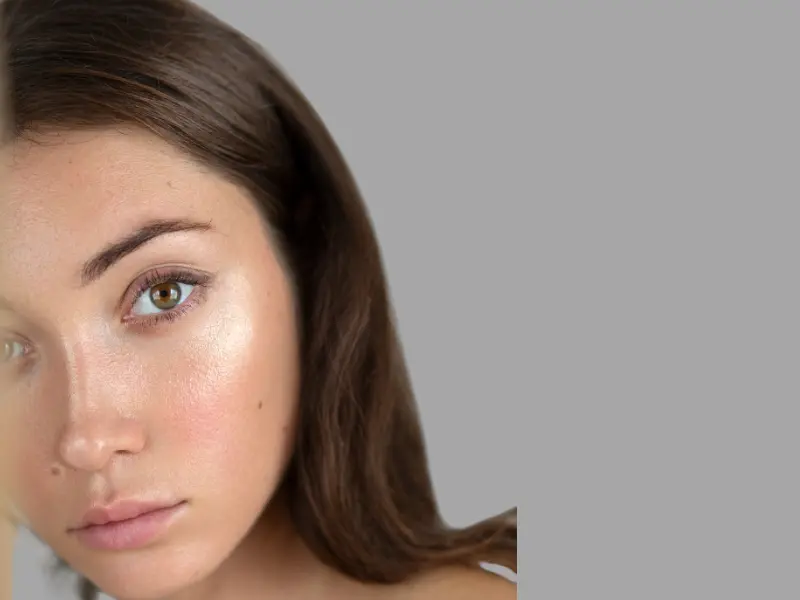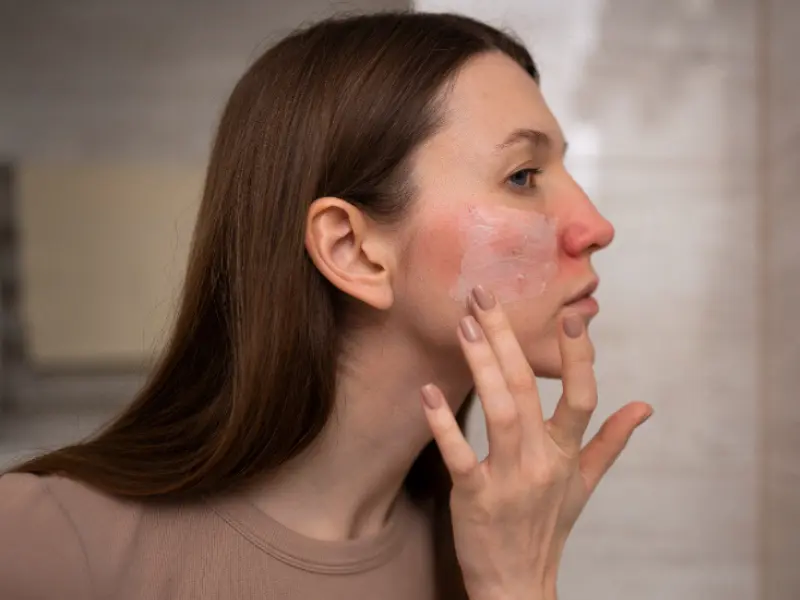Does Glycerin Cause Acne?
Published: 23 Mar 2025
- Glycerin doesn’t clog pores, but pairing it with heavy products can lead to breakouts.
- It’s safe for acne-prone skin when used in lightweight, non-comedogenic formulas.
- Always apply it on clean skin to prevent trapping dirt and oil.
Is glycerine really causing your breakouts, or is it just a skincare myth? Many people ask, Does glycerine cause acne? It’s easy to blame any sticky or oily feeling on the wrong ingredient.
Here, we’ll unravel the truth, clear up the confusion, and share real tips to keep your skin happy and healthy.
What Is Glycerine?
Glycerine, also known as glycerol, is a clear, odorless, and colorless liquid derived from plant oils or animal fats.
In skincare, it’s primarily used as a humectant, meaning it draws moisture from the environment and deeper skin layers to the outer skin, helping to keep it hydrated.
Can Glycerin Cause Acne?
No, glycerin itself does not directly cause acne. However, its effects on the skin depend on several factors, including:
- Skin Type: Oily skin may experience clogged pores if glycerin is layered incorrectly.
- Other Ingredients: Some skincare products contain glycerin along with comedogenic (pore-clogging) ingredients that can trigger breakouts.
- Improper Skincare Routine: Using glycerin with heavy, occlusive products can trap oil, dirt, and bacteria, potentially worsening acne.

While glycerin is generally non-comedogenic (does not block pores), improper use may contribute to breakouts. The key is knowing how to incorporate it correctly into your skincare routine.
Confused about what products to pick? Don’t worry, I’ll show you exactly what to look for later in this guide.
How Glycerine Affects Different Skin Types
Dry Skin
- Glycerine is a powerful humectant, meaning it draws moisture from the environment and deeper skin layers to the outer skin, helping to keep it hydrated.
- It helps to repair and maintain the skin’s natural barrier, which is crucial for individuals with dry skin conditions.
- Regular use can alleviate tightness and flakiness associated with dry skin.
Oily/Acne-Prone Skin
- Glycerine is non-comedogenic, meaning it doesn’t clog pores, making it suitable for oily and acne-prone skin.
- It hydrates the skin without adding greasiness, which is beneficial for oily skin types.
- Some individuals may find it slightly sticky; using lightweight, water-based formulations can mitigate this sensation.
Sensitive Skin
- Glycerine is generally gentle and well-tolerated by sensitive skin.
- Its soothing and hydrating properties can help alleviate irritation and redness.
In rare cases, individuals with extremely sensitive skin may experience mild irritation; it’s advisable to patch-test products before full application.
Common Misconceptions About Glycerine and Acne
1. Glycerine’s Stickiness Means It Closes Pores
- Fact: Glycerine is a humectant, meaning it draws moisture to the skin’s surface. Its slightly sticky texture doesn’t equate to pore-clogging.
- Expert Insight: Dermatologist Dr. Leung clarifies that glycerine is non-comedogenic and doesn’t clog pores.
2. All Greasy Ingredients Cause Acne
- Fact: Not all oily substances are comedogenic. For instance, refined olive oil has a comedogenicity rating of 0, indicating it’s unlikely to clog pores.
- Expert Insight: Formulation matters. Even ingredients with higher comedogenicity ratings can be safe if used correctly in products tailored for acne-prone skin. (1)
Expert Opinions and Research Findings
1. Dermatologists Confirm Glycerine’s Safety for Acne-Prone Skin
- Expert Insight: Board-certified dermatologist Dr. Azadeh Shirazi states, “Glycerin is a gentle ingredient that’s suitable for all skin types. It’s a safe, well-tolerated ingredient, even in someone with sensitive skin, so it’s wonderful in moisturizers.”
2. Studies Highlight Glycerine’s Moisturizing Benefits Without Increasing Acne Risk
- Research Finding: A study on ScienceDirect shows that moisturizers with glycerine help keep skin hydrated and reduce irritation without making acne worse.
3. Acne Triggers: Oils and Comedogenic Ingredients, Not Glycerine
Research Insight: A review article on comedogenicity notes that while some oils and other ingredients can clog pores and potentially cause acne, glycerine is generally considered non-comedogenic and safe for acne-prone skin.
Who Should Be Cautious with Glycerin?
Oily & Acne-Prone Skin: Glycerin is a humectant (a substance that draws moisture into the skin), but using it in heavy formulations may contribute to clogged pores. Opt for lightweight (non-greasy, easily absorbed), water-based products.

Combination Skin: Glycerin can work well, but balancing it with non-comedogenic ingredients is essential. Applying it in moderation prevents excess shine in the T-zone (forehead, nose, and chin area, which tends to be oilier).
Dry Skin: Glycerin is highly beneficial for those with dry, dehydrated skin as it helps retain moisture and improves skin barrier function. Using it with occlusives (ingredients that seal moisture in) like shea butter or ceramides can enhance hydration.

Tips to Use Glycerine Safely if You Have Acne-Prone Skin
1. Choose Pure or Simple Glycerine Products Without Heavy Oils or Fragrances
- Opt for Non-Comedogenic Formulations: Select products labeled as “non-comedogenic” to ensure they don’t clog pores.
- Avoid Heavy Oils and Fragrances: These can irritate the skin and potentially worsen acne.
2. Patch Test Before Applying All Over the Face
- Conduct a Patch Test: Apply a small amount of the product on a discreet area of your skin (like behind your ear) and wait 24 hours to check for any adverse reactions.
3. Combine Glycerine with Non-Comedogenic Moisturizers
- Pair with Lightweight Moisturizers: Use glycerine in conjunction with moisturizers that are oil-free and non-comedogenic to maintain hydration without clogging pores.
4. Keep Your Skin Clean to Avoid Bacteria Buildup, Which Can Worsen Acne
- Regular Cleansing: Wash your face twice daily with a gentle, sulfate-free cleanser to remove dirt.
- Avoid Over-Cleansing: Over-washing can strip the skin of natural oils, leading to increased oil production and potential breakouts.
5. Use Glycerine-Based Products with Acne-Fighting Ingredients
- Look for Complementary Ingredients: Choose products that combine glycerine with acne-fighting ingredients like salicylic acid or benzoyl peroxide to address acne while maintaining skin hydration.
6. Monitor Your Skin’s Response
- Observe Changes: Pay attention to how your skin reacts after introducing glycerine into your routine. If you notice increased irritation or breakouts, discontinue use and consult a dermatologist.
9. What You Should Know: When to Avoid Glycerine
1. If You Have a Rare Allergy or Irritation to Glycerine
- Possible Reactions: Some individuals may experience skin irritation, redness, or swelling after using products containing glycerine.
- Patch Testing: To determine sensitivity, apply a small amount of the product to a discreet area and wait 24 hours for any adverse reactions.
- Consultation: If irritation occurs, discontinue use and consult a dermatologist for alternative options.
2. Avoid Products with Low-Quality Glycerine Mixed with Pore-Clogging Ingredients
- Check Ingredient Lists: Products with glycerine may also contain comedogenic ingredients like heavy oils or silicones that can clog pores.
- Choose Wisely: Opt for products labeled as “non-comedogenic” and “oil-free” to minimize the risk of breakouts.
3. When Your Skin Reacts Badly, Check the Full Ingredient List
- Comprehensive Review: Sometimes, it’s not glycerine but other ingredients that cause irritation or breakouts.
- Identify Triggers: Common culprits include fragrances, alcohols, or certain preservatives.
Adjust Accordingly: If you identify a problematic ingredient, choose products that are free from it and observe your skin’s response.
4- Conclusion
So, guys, in this article, we’ve covered the question “Does Glycerin Cause Acne?” in detail. The truth is, glycerin itself isn’t the enemy—it all depends on how you use it.
If you have oily or acne-prone skin, opt for lightweight, non-comedogenic products and always cleanse properly. Personally, I’d recommend doing a patch test before adding glycerin to your routine to see how your skin reacts.
Found this helpful? Share it with a friend who’s scared of trying Glycerin
5- FAQs
No, glycerin itself is non-comedogenic (won’t clog pores). However, if mixed with heavy or occlusive ingredients, it might trap dirt and oil, leading to breakouts. Always use it in lightweight, well-formulated skincare products.
No, vegetable glycerin is also non-comedogenic and works well for most skin types. But if layered with thick creams or oils, it can trap impurities and cause congestion. Always cleanse your skin properly before applying it.
Yes, but it depends on how you use it. Glycerin helps hydrate the skin, but using it with heavy products may lead to clogged pores. Choose oil-free and non-comedogenic glycerin-based products to avoid breakouts.
Not directly, but improper use can. If combined with pore-clogging ingredients or applied on dirty skin, it may trap oil and bacteria. Use a lightweight formulation and cleanse your skin before applying glycerin.
Yes, but in the right formulation. Look for water-based, non-greasy products with glycerin to keep your skin hydrated without making it oily. Avoid using it with thick, heavy creams.
Yes, but it’s best to dilute it with rose water or aloe vera gel to prevent stickiness. Using pure glycerin without dilution can sometimes feel too heavy, especially for oily skin. Patch-test first to see how your skin reacts.
Both are great humectants (moisture-attracting ingredients), but hyaluronic acid works better for deep hydration. Glycerin is more budget-friendly and works well in humid climates. You can even use both in your skincare routine.
Yes, but in moderation. Use it as part of a balanced skincare routine rather than applying too much at once. Overuse can sometimes make the skin feel greasy.
It won’t fade scars directly, but it helps keep the skin hydrated and speeds up healing. For better scar reduction, pair glycerin with ingredients like niacinamide or vitamin C. Hydrated skin always heals better!
If you notice new pimples, clogged pores, or increased oiliness after using glycerin, it might not suit your skin. Try switching to a lighter, oil-free glycerin product and see if your skin improves. Always patch-test new skincare products before full application.
6- References
At MedicaWire, all medically sensitive content is reviewed by licensed healthcare professionals. Our team ensures that the information you read is accurate, up-to-date, and based on trusted medical sources.
Learn how we maintain high standards by reading our Editorial Policy.
📚 Sources
- Skin Surface Glycerol Levels in Acne Vulgaris
This study measured glycerol levels in skin surface washings of acne patients, both untreated and treated with oral tetracycline, as well as in control subjects.
pubmed.ncbi.nlm.nih.gov - Glycerin For Skin: Benefits, Side Effects, Best Types to Use
According to a 2016 study, glycerin is “the most effective humectant” available to increase hydration on the top layer of your skin, in comparison with numerous others, including alpha hydroxy acids, hyaluronic acid, propylene glycol, sorbitol, and urea.
Healthline - Glycerin is a Badass Queen. Here’s Why According to Science!
This article discusses the safety of glycerin for fungal acne and explains the reasons it should be used.
Simple Skin Care Science - Why Every Dermatologist Loves Glycerin
Studies show that skincare products containing glycerin can significantly improve the appearance of rough, dry skin.
harpersbazaar.com - What Non-Comedogenic Ingredients Mean for Acne-Prone Skin
This article discusses the importance of non-comedogenic ingredients, like glycerin, for those with acne-prone skin.
instyle.com
ℹ️ Our Promise
MedicaWire follows strict sourcing guidelines and only references peer-reviewed studies, academic institutions, and reputable medical associations. We update content regularly to reflect new health information.

- Be Respectful
- Stay Relevant
- Stay Positive
- True Feedback
- Encourage Discussion
- Avoid Spamming
- No Fake News
- Don't Copy-Paste
- No Personal Attacks



- Be Respectful
- Stay Relevant
- Stay Positive
- True Feedback
- Encourage Discussion
- Avoid Spamming
- No Fake News
- Don't Copy-Paste
- No Personal Attacks




